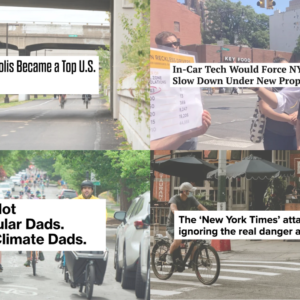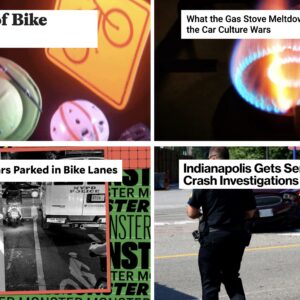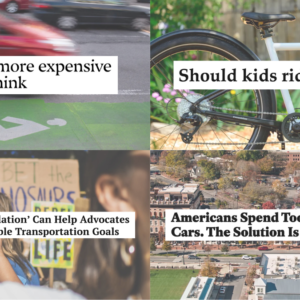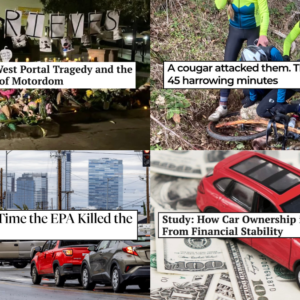
(Photo: Curtis Ailes)
Here are the bike links from around the world that caught our eyes this week:
Commercial appeal: Much of the beautiful Indianapolis Cultural Trail has started to hum with new developments, but one section of the first-rate bike network hasn’t: Massachusetts Avenue, where planners decided to zigzag the trail to preserve some on-street parking.
Assuming error: Instead of emphasizing education, the Swedish philosophy of street safety “assumes human imperfection at every turn” and asks engineers to mitigate it with design, writes the NYT in a report from the world capital of safe streets: Stockholm.
The upside of uncertainty: One of Sweden’s tricks is to design low-visibility streets that have more minor crashes but fewer serious ones.
Baldwin as salmon: Semi-professional flipout artist Alec Baldwin called New York City “a mismanaged carnival of stupidity that is desperate for revenue and anxious to criminalize behavior once thought benign” after being cited for riding his bike the wrong way on Fifth Avenue.
Lock and leave: A $249 app-activated bike lock could improve peer-to-peer bike sharing.
Separation instinct: Environmental activists installed the first bike lane in Beirut by painting a blue stripe on a sidewalk, but the city’s mayor says it should be in the street instead.
Trip differentiation: A progressive British think tank says the UK’s taxation of cars should start distinguishing between necessary and unnecessary trips in order to be fairer to poor people.
Federal transpo: The Senate’s version of a new transportation bill gets “a solid B+” (and a useful visualization of the relevant issues) from the League of American Bicyclists.
Outmoded policymaking: Streetsblog USA reports on the weird legislative practice that keeps roads and transit in separate siloes while transportation bills are planned.
Numbers talk: The Bike League’s top two policy wonks sat down for an hour-long video discussion of the recent Census report on bike commuting.
Why bikes: “What we desperately need is more people living in dense areas and traveling in ways that don’t burn fossil fuels,” writes Washington Post innovations editor Matt McFarland in a case for the public benefit of boosting biking.
Helmet laws don’t help: Vox has written up maybe the best summary I’ve seen of the case against mandatory helmet laws.
Speaking of which: Dallas “is finally considering getting rid of what may be its dumbest law: the helmet ordinance,” a local site writes.
Bike policy 101: Vox uses seven graphics to capture the basics of bike use in the United States and put them in a global context.
Bike business branding: Chicago’s Lakeview and West Town neighborhoods have created a voluntary “Bike Friendly Business” program with “about 25” businesses on board so far.
Why bicycles inflame: “Bike wars are culture wars,” an Australian columnist writes. “Bike-hate is not principally about delay.”
“It’s posh to pedal”: The financial health experts at mint.com have a nicely wide-ranging infographic about bike transportation.
Scarce parking: Washington DC has added 3,000 public bike racks in 10 years but can’t keep up with demand.
Your video of the week comes courtesy of Tucson Velo, which reported last week on a group ride that saw sheriff’s deputies issue citations to 25 of the people below for running a stop sign. Here’s the police record of the deed:
If you come across a noteworthy bicycle story, send it in via email, Tweet @bikeportland, or whatever else and we’ll consider adding it to next Monday’s roundup.







Thanks for reading.
BikePortland has served this community with independent community journalism since 2005. We rely on subscriptions from readers like you to survive. Your financial support is vital in keeping this valuable resource alive and well.
Please subscribe today to strengthen and expand our work.
I saw this article about not riding with a helmet several weeks before the Vox story. Every bit as good if not better: http://www.howiechong.com/journal/2014/2/bike-helmets
Adults should have the right to make their own decision on helmet use, but actively advocating in the media against their use using spurious arguments like Howie does is irresponsible and at worst, likely to leave him with blood on his hands if someone dies or is seriously injured following his advice. Fantastic takedown of his position here: http://amateurplanner.blogspot.com/2014/05/deconstructing-dont-bike-with-helmet.html
He’s not advocating for people to either wear them or not wear them – he’s simply stating that it’s okay to not wear them and for nobody to be shamed into doing one behavior or the other.
Still, good rebuttal. Thanks.
The story that accompanies the video says that *every single one* of those riders was given a ticket for not stopping. It’s clear that several of those folks do stop, and you can’t see faces. How did they know who was who?
It’s a good thing that they were all stopped and ticketed. They could have killed someone! Think of the children!
Bike-hate is not principally about delay. Motorists show remarkable patience for other cars. They’ll sit comfortably behind stoppers, parkers, turners and incompetents of all kinds. But sitting behind a bike makes many people mad. Really mad. Why? Because bikes represent cultural change. Cultural change is threatening.
a great explanation for why being a “bike ambassador” is pointless.
All depends on if the ambassadorship consists of saying, or actually doing.
the streetsblog video from the washington post article highlights the thing i love the most about dutch cycling:
Ⓐ BIKE ANARCHY Ⓐ
https://www.youtube.com/watch?feature=player_embedded&v=G4qgzsaNN7s
(go to 5:06)
As a messenger I used to relax and disappear in the Indianapolis alley pictured. Have a nice cup of coffee by myself without people asking me questions..
I thought it was an interesting comparison and certainly has some parallels with the 20’s bikeway conversation here. Not apples to apples of course, but your comment about sitting in the alley speaks volumes about foot traffic and its potential impact on business.
Tractor trailers have a separate plate and registration, and could be theoretically thought of as a separate vehicle in tandem. I wonder how many tickets AZ cops have given to trailers that just followed and rolled right though a stop after the cab stopped and went when clear?
But of course they were out to make those “counter-culture warriors” have a bad day no matter what. I bet if the cyclists had gotten wind of what was up, and stopped all individually they would have been ticketed for obstructing the flow of traffic.
I wish we had 25 cyclists cited in a police sting in Portland just so BikePortland could get its first 1,000-comment post.
Group rides are tricky subjects for local police departments. If you sit at a popular stop sign on Alpine Road on a weekend morning, you’ll invariably see police officers either watching for and ticketing bicyclists, or stopping motorists and waiving group rides around the right-hand turn. Further up the peninsula on another popular downhill you’ll find a motorcycle cop who hides away and spends his day chasing bicyclists who don’t stop. They definitely know the schedules and characteristics of the local group rides, and their behavior often depends on the amount of public outcry they get either for or against leniency or enforcement. Around here both sentiments come in waves.
Conviction based on that Tucson video would be extremely difficult. There are clearly many riders who legally stopped, but what’s much less clear is who was who, especially with the same kit. They should coordinate their appeals based on the fact the officers can’t prove who stopped and who didn’t, much like red-light runners (and NMA activists) have nearly obsoleted red-light cameras based on proof of who was driving the car at the time.
I found the culture wars article interesting. I thought it could have gone further along the reasons for the culture warring, but it is written in an interesting style.
I particularly enjoyed this little tidbit: ” A city without pedestrians is not a city. It’s a business park. And bikes are pedestrians on wheels.”
A pearl of wisdom it would be good to keep in mind whenever merchants are terrified of removing parking.
Indeed.
My favorite quote from that article:
“But this isn’t about what I want. Sadly, it’s not even about what you want. It’s about the wants of the other 7.2 billion planetary humans. Which makes it, simply, obvious. We can’t all drive everywhere.”
It’s a “culture war”? That explains so much. Those who have been transportation cycling for decades just assume that the whole population is into it too or at least is aware of but there are still motorist bubbles that some are living in and from their perspective, “cyclists” are a new thing on the scene.
I’ve observed people who show remarkable patience while being delayed in a traffic jam of cars in front of them yet are bothered by a small group of people cycling and delaying them a few seconds.
Weird double standard there.
And I suppose no matter how much a “motorist” might be in denial, deep down they know that things will never be the same again. There will never been empty roads with cheap gasoline ever again.
I feel for them but it’s their own fault at the end of the day. :p